World Geography And Politics Daily News | 02 Jul 2023

Views (140)
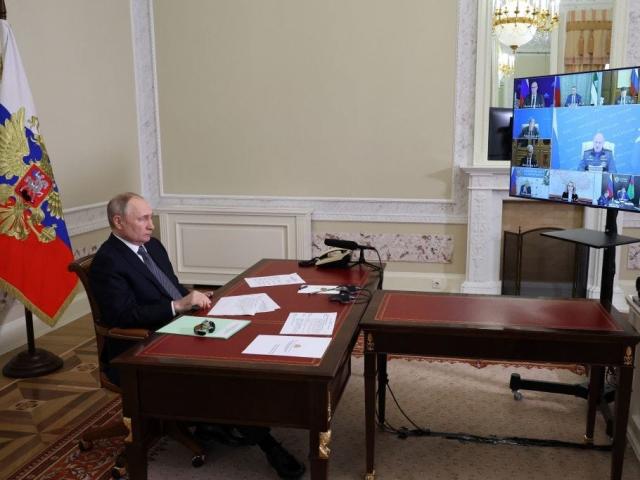
More people want to kill Putin than want to kill me, Zelenskyy says
Ukrainian President Volodymyr Zelenskyy has said Russian dictator Vladimir Putin is in greater danger than he is, as "there are more people who want to kill him.”

Asked what it is like to live under constant danger throughout the full-scale war, the head of state said that he is used to danger because it has become part of his life, unlike Putin, whom "more people" want to kill, according to Zelenskyy.
"I will tell you that Putin is in more danger than I am now. More people want to kill him," the president said.
"Many people next to me also live in danger," he added. “This is a conscious choice we have made. I am proud of the task I am facing. I can live with it.”
Zelenskyy also emphasized that soldiers on the front line are in the greatest danger.
"Every second," the Ukrainian leader said. “Constant explosions. It is very difficult to sleep and survive. I have been there several times and I know what is happening. God will give them the strength to continue and return home.”
Earlier, UK newspaper the Independent reported that Zelenskyy had survived more than 12 assassination attempts since the beginning of Russia's full-scale invasion.
Some of the attempts were thwarted by the U.S. Central Intelligence Agency, the newspaper claimed.
Putin, a germaphobe known for meeting with people at ridiculously long tables, took selfies kissing regular Russians this week
Putin, who has met with world leaders at a very long table, cozied up to Russians this week while doing damage control after the Wagner rebellion.
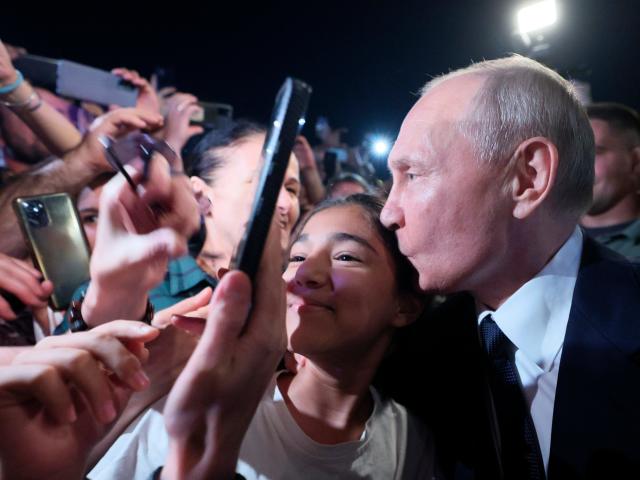
Putin made a couple public appearances this week while doing damage control after the Wagner rebellion.
He was even photographed taking selfies and kissing a member of the public.
The images provided a stark contrast to the famously long tables he has used at the Kremlin.
The sight of Putin kissing the head of a young Russian admirer stood in stark contrast to the images of Putin taking meetings at a confusingly long table. Reports have said the long table was used as a precaution against COVID-19, but the images were striking.
Mourners bury slain teen as Macron scraps trip, officials again deploy tens of thousands of police
Hushed and visibly anguished, hundreds of mourners from France’s Islamic community formed a solemn procession from a mosque to a hillside cemetery on Saturday to bury a 17-year-old whose killing by police has triggered days of rioting and looting across the nation. Underscoring the gravity of the crisis, President Emmanuel Macron scrapped an official trip to Germany after a fourth straight night of unrest across France. Interior Minister Gerald Darmanin tweeted late Saturday that 200 riot police would be mobilized in the port city of Marseille, where TV showed footage of tear gas and officers in the streets as night fell.
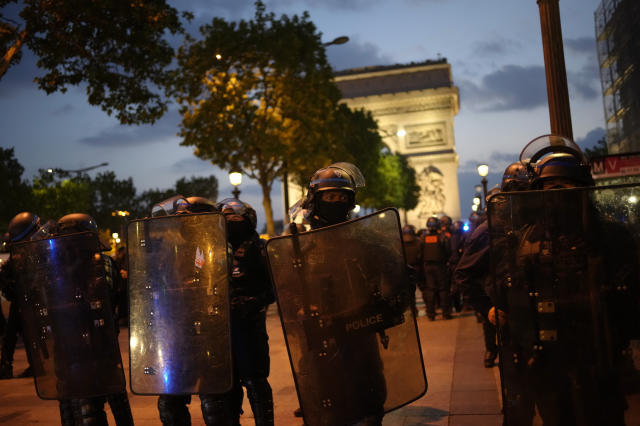
NANTERRE, France (AP) — Hushed and visibly anguished, hundreds of mourners from France’s Islamic community formed a solemn procession from a mosque to a hillside cemetery on Saturday to bury a 17-year-old whose killing by police has triggered days of rioting and looting across the nation.
Underscoring the gravity of the crisis, President Emmanuel Macron scrapped an official trip to Germany after a fourth straight night of unrest across France. Officials said they were again deploying 45,000 police to the streets nationwide in an effort to head off a fifth night of violence.
Some 2,400 people have been arrested overall since the teen's death on Tuesday. Interior Minister Gerald Darmanin tweeted late Saturday that 200 riot police would be mobilized in the port city of Marseille, where TV showed footage of tear gas and officers in the streets as night fell. Police said 29 people were arrested there, and at least 37 were arrested in Paris near the Champs-Elysées, where police vans were seen parked outside luxury stores in one of the capital’s most high-profile areas.
“Men first,” an official told dozens of women waiting to enter the cemetery. But Nahel’s mother, dressed in white, walked inside to applause and headed toward the grave. Many of the men were young and Arab or Black, coming to mourn a boy who could have been them.
Inside the cemetery gate, the casket was lifted above the crowd and carried toward the grave. The men followed, some holding little boys by the hand. As they left, some wiped their eyes. Police were nowhere to be seen.
The unrest was taking a toll on Macron's diplomatic profile. German President Frank-Walter Steinmeier's office said Macron phoned Saturday to request a postponement of what would have been the first state visit by a French president to Germany in 23 years. Macron had been scheduled to fly to Germany on Sunday evening for the visit to Berlin and two other German cities.
Macron’s office said he spoke with Steinmeier and, “given the internal security situation, the president (Macron) said he wishes to stay in France over the coming days."
Nahel was shot during a traffic stop. Video showed two officers at the window of the car, one with his gun pointed at the driver. As the teenager pulled forward, the officer fired once through the windshield. This week, Nahel's mother told France 5 television that she was angry at the officer who shot her son, but not at the police in general.
"He saw a little Arab-looking kid, he wanted to take his life,” she said.
Nahel's family has roots in Algeria.
Hundreds of police and firefighters have been injured in the violence that erupted after the killing. Authorities haven’t released injury tallies for protesters. In French Guiana, an overseas territory, a 54-year-old died after being hit by a stray bullet.
The reaction to the killing was a potent reminder of the persistent poverty, discrimination, unemployment and other lack of opportunity in neighborhoods around France where many residents trace their roots to former French colonies -- like where Nahel grew up.
“Nahel’s story is the lighter that ignited the gas. Hopeless young people were waiting for it. We lack housing and jobs, and when we have (jobs), our wages are too low,” said Samba Seck, a 39-year-old transportation worker in the Paris suburb of Clichy-sous-Bois.
Clichy was the birthplace of weeks of riots in 2005 that shook France, prompted by the deaths of two teenagers electrocuted in a power substation while fleeing from police. One of the boys lived in the same housing project as Seck.
Like many Clichy residents, he lamented the violence targeting his town, where the remains of a burned car stood beneath his apartment building, and the town hall entrance was set alight in rioting this week.
“Young people break everything, but we are already poor, we have nothing,” he said, adding that "young people are afraid to die at the hands of police.”
Finance Minister Bruno Le Maire promised government support for shop owners.
“There is no nation without order, without common rules,” he said.
___
Charlton reported from Paris. Associated Press writers Jade le Deley in Clichy-sous-Bois, France; Claire Rush in Portland, Oregon; Jocelyn Noveck in New York: and Geir Moulson in Berlin, contributed to this report.
CIA's Burns: armed mutiny shows damage Putin has done to Russia
(Reuters) -U.S. CIA Director William Burns said on Saturday that the armed mutiny by mercenary leader Yevgeny Prigozhin was a challenge to the Russian state that had shown the corrosive effect of President Vladimir Putin's war in Ukraine. Putin this week thanked the army and security forces for averting what he said could have turned into a civil war, and has compared the mutiny to the chaos that plunged Russia into two revolutions in 1917. For months, Prigozhin had been openly insulting Putin's
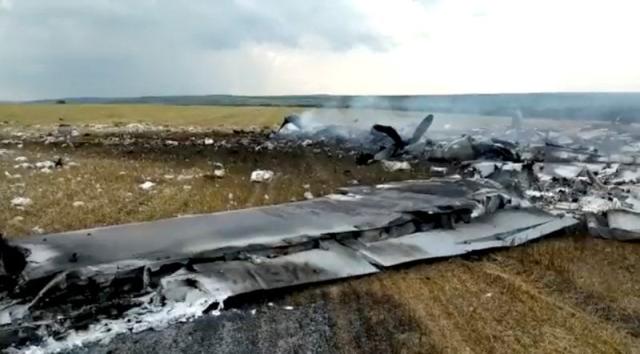
By Guy Faulconbridge
(Reuters) -U.S. CIA Director William Burns said on Saturday that the armed mutiny by mercenary leader Yevgeny Prigozhin was a challenge to the Russian state that had shown the corrosive effect of President Vladimir Putin's war in Ukraine.
Putin this week thanked the army and security forces for averting what he said could have turned into a civil war, and has compared the mutiny to the chaos that plunged Russia into two revolutions in 1917.
For months, Prigozhin had been openly insulting Putin's most senior military men, using a variety of crude expletives and prison slang that shocked top Russian officials but were left unanswered in public by Putin.
"It is striking that Prigozhin preceded his actions with a scathing indictment of the Kremlin's mendacious rationale for the invasion of Ukraine and of the Russian military leadership's conduct of the war," Burns said in a lecture to Britain's Ditchley Foundation - a non-profit foundation focused on U.S.-British relations - in Oxfordshire, England.
"The impact of those words and those actions will play out for some time - a vivid reminder of the corrosive effect of Putin's war on his own society and his own regime."
Burns, who served as U.S. ambassador to Russia from 2005 to 2008 and was appointed CIA director in 2021, cast Prigozhin's mutiny as an "armed challenge to the Russian state".
He said the mutiny was an "internal Russian affair in which the United States has had and will have no part."
Since a deal was struck a week ago to end the mutiny, the Kremlin has sought to project calm, with the 70-year-old Putin discussing tourism development, meeting crowds in Dagestan, and discussing ideas for economic development.
CIA RECRUITMENT
Russia will emerge stronger after the failed mutiny so the West need not worry about stability in the world's biggest nuclear power, Foreign Minister Sergei Lavrov said on Friday.
But Burns said that the war had already been a strategic failure for Russia by laying bare its military weakness and damaging the Russian economy for years to come, while the NATO military alliance was growing bigger and stronger.
Burns said Russia's "future as a junior partner and economic colony of China" was being shaped "by Putin's mistakes."
He said disaffection in Russia with the war in Ukraine was creating a rare opportunity to recruit spies - and the CIA was not letting it pass.
"Disaffection with the war will continue to gnaw away at the Russian leadership beneath the steady diet of state propaganda and practiced repression," Burns said.
"That disaffection creates a once-in-a-generation opportunity for us at the CIA - at our core a human intelligence service. We're not letting it go to waste."
The Kremlin said in May that its agencies were tracking Western spy activity after the CIA published a video encouraging Russians to make contact via a secure internet channel.
The short video in Russian was accompanied by a text saying the agency wanted to hear from military officers, intelligence specialists, diplomats, scientists and people with information about Russia's economy and its leadership.
(Reporting by Guy Faulconbridge; Editing by Andrew Cawthorne and David Holmes)
‘Chinese Banksy’ says British art galleries fear being called racist
A Chinese political artist who has provoked the ire of Xi Jinping has accused “Left-leaning” galleries of not exhibiting his work for fear of being labelled racist.
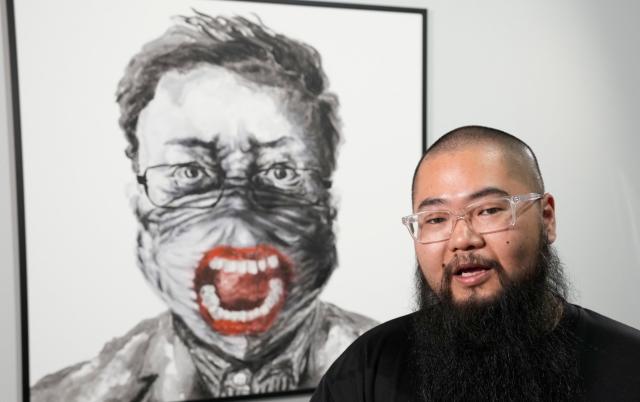
A Chinese political artist who has provoked the ire of Xi Jinping has accused “Left-leaning” galleries of not exhibiting his work for fear of being labelled racist.
A major exhibition of his work in Warsaw, which opened last week, required round-the-clock police protection and prompted multiple visits from a senior Chinese diplomat in an effort to shut it down, as well as furious complaints to the Polish government.
On a brief visit to London this week, Badiucao said no British gallery had yet shown similar “courage”.
“A lot of people and institutions cherish their reputation more than caring about the truth,” he told The Telegraph. “They play safe.”
“The political spectrum among our [art] community is more Left-leaning,” he added.
“Because of that, they are really worried about being labelled as racist.”
A key plank of China’s so-called wolf warrior diplomacy under Mr Xi has been to conflate criticism of the Chinese Communist Party and its leaders with anti-Chinese racism.
A spike in death threats ahead of the Warsaw exhibition forced Badiucao to go into “lockdown” in the Ujazdowski Castle Centre for Contemporary Art due to fear for his safety.
The exhibition features paintings of Mr Xi and Vladimir Putin eating from the flesh of dead children, as well a portrait of Mao Zedong, founder of the People’s Republic of China, with paint thrown at it.
“Before I make any agreement with a museum I tell them that this is a possibility,” he said.
“You just have to accept the whole menu.”
Now resident in Australia, the artist, in his late thirties, originally practised anonymously, giving rise to the Banksy comparison.
However, his identity was discovered by the CCP in 2018 and family were hauled into the local police station and threatened.
He has since cut off all contact with them to protect them from the official anger generated by his work.
“They want you to carry a sense of guilt – you’re the reason they’re suffering, so you must stop.”
The artist’s family has a record of persecution by the communist authorities.
His grandfather was a leading figure in Shanghai’s film-making industry in the 1940s but was later sent to a labour camp, where he vanished.
Left without her husband, Badiucao’s grandmother died of poverty.
Now a resident in Australia, he is constantly wary of his security when travelling overseas, following the kidnapping of other dissident artists and publishers.
Only last month the Australian embassy in Poland warned him about the dangers he faced when travelling.
Fake social media accounts purporting to belong to Badiucao were also set up in the run-up to the opening, which the artist believes was the work of people working on behalf of the CCP to discredit him.
However, he is determined to promote his work and its message abroad, but faces an uphill battle to persuade major galleries to take the risk of displeasing China.
“They need to do their basic job,” he said.
“I believe that art should be the avant-garde for freedom of speech, particularly those public-funded institutions.
“They should be the place where art feels safe to express those ideas.”
He added: “Intellectuals in our community have been very sensitive, and the Chinese government will insist on a racist narrative.”
One of the artist’s best known works depicts Mr Xi with a hunting rifle above the dead body of Winnie the Pooh, a comment on the regime’s fury at earlier depictions of the premier as the portly bear.
“When you bridge something very common and loved like Winnie the Pooh to this taboo image, like the face of a national leader, you create this catch 22 for the censorship system,” he said.
“Because if they’re censoring those, then people ask questions.”
Jessica Ní Mhainín, head of policy and campaigns at Index on Censorship, called on British galleries to step up.
“Any artistic institution that values democracy and human rights should be supporting dissident artists – and one of the most important ways of doing this is by exhibiting their work.”
Putin in a 'heightened emotional state' and 'bordering on euphoria' following failed Wagner mutiny, Russia analyst says
Vladimir Putin is in a "heightened emotional state" following the failed Wagner mutiny, said Tatiana Stanovaya, an analyst on Russia.
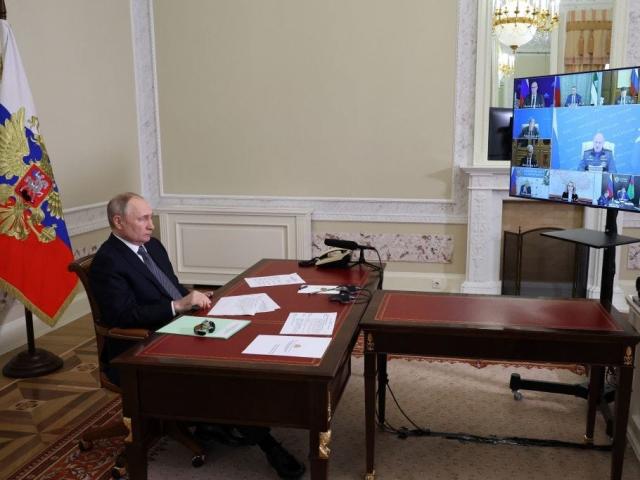
Vladimir Putin is in a "heightened emotional state" following the Wagner mutiny, a Russia expert says.
It makes him susceptible to manipulation, and his entourage is gaining power, said Tatiana Stanovaya.
The mutiny, although short-lived, appears to have weakened the Russian president.
Russian President Vladimir Putin is in a "heightened emotional state" following the failed mutiny from the mercenary Wagner Group, a Russia analyst said.
The short-lived rebellion led by Wagner Group leader Yevgeny Prigozhin involved his troops marching toward Moscow before ultimately turning around to avoid bloodshed.
Now, the Russian leader has appeared to be embarking on damage control following the mutiny.
"Recently, his public appearances have depicted an inexplicable joy bordering on euphoria, a stark departure from his usual demeanor," said Stanovaya.
She believes his handlers wanted to create a perceived atmosphere of Russia's affection for the embattled 70-year-old leader.
"This could be connected to the narrative his entourage has crafted, emphasizing the universal support he receives from the elites and the immense love he enjoys from the people," she said.
"We appear to be observing a new phase in Putin's regime, where his entourage is becoming more actively involved in shaping its trajectory."
0 Likes
